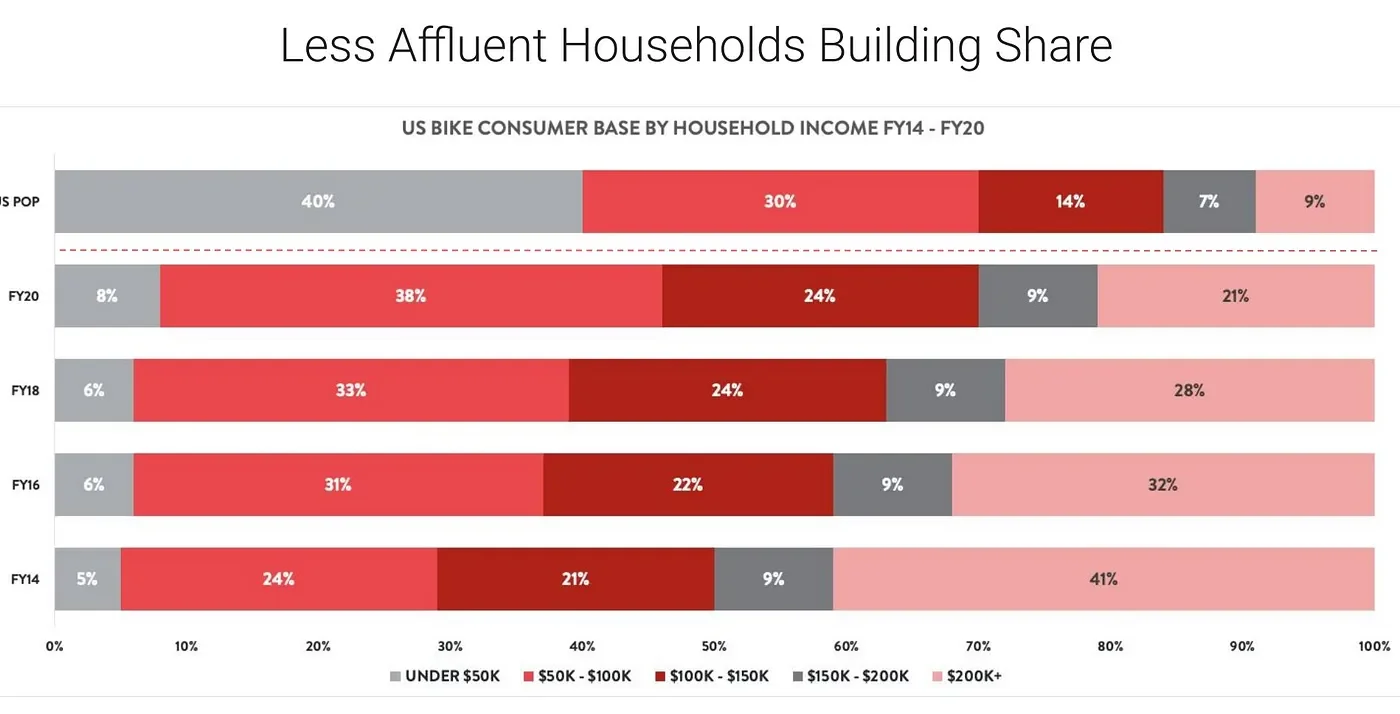Peloton Tried to Be Netflix. Right Now It’s Just Dell on Wheels.
Peloton’s latest earnings sent the stock down over 40%, and honestly, nobody should be shocked. Growth is slowing, customers are drifting, and the company is still stuck with an identity that no longer fits. Peloton wants to be the Netflix of at-home fitness, but the market still sees them as an overpriced spin bike built for wealthy people who cruised through lockdown while everyone else suffered.
And that’s Peloton’s real problem. Not the hardware. Not the instructors. Not the quarterly misses. The brand.
Peloton Wants to Grow Beyond the Bike, but the Brand Never Left It
Peloton keeps insisting it’s more than a bike company. The app now covers strength, yoga, running, and other training modes. They’re working on new hardware that has nothing to do with pedaling in place. They’re trying to diversify away from their star instructors so the entire business isn’t dependent on a handful of personalities that could retire or get poached.
But the perception hasn’t changed.
To the outside world, Peloton still is the bike. Worse — it’s the status symbol of rich people doing cardio in tastefully lit basements.
The Reality Peloton Rarely Shows: The Members Aren’t the Elite
Their Facebook community paints a different picture. Real people in cramped spaces. People who financed the bike because they couldn’t afford to pay upfront. People who used it to claw their way through depression, monotony, illness, or job loss.
Households making under $100,000 grew from 29% of Peloton members in 2014 to 46% in 2020. Nearly half. That’s not elite. That’s everyday people.
But Peloton never shows it. Their own brand voice still screams luxury.
Peloton’s Messaging Is All Over the Place
The website feels like a luxury catalog. The ads hit the same note. They even hired Adam & Eve DDB to produce a glossy, cartoonish Scrooge-themed holiday spot. One of the priciest agencies on earth for a storyline that looked more like a parody.
The mission statement reads well — “use technology and design to connect the world through fitness, empowering people to be the best version of themselves anywhere, anytime.” But the execution doesn’t match.
Some days the focus is community with “Together we go far.”
Other days instructors become celebrities.
Sometimes the tone is playful on Twitter.
Sometimes it shifts back to luxury.
Sometimes it leans inspirational.
Sometimes they drop a corny holiday ad.
Brands don’t survive this kind of whiplash. They survive clarity.
The Founding Story Doesn’t Help Either
Peloton’s official origin story is that John Foley couldn’t book a trendy New York spin class, so he built his own bike to skip the line.
Maybe that’s true. It also reads like:
“I was too busy to book a $36 class, so I built a $2,000 bike instead.”
It reinforces the exact narrative Peloton desperately needs to escape.
Peloton Needs a Mission That Extends Beyond Buying Hardware
Nike became Nike through purpose.
Lululemon built culture.
Gymshark built community.
The strongest fitness brands do not sell equipment. They sell identity.
Peloton has real member stories that reflect real life — burnout, grief, monotony, depression — and how exercise helped people claw their way back to themselves. Those stories are powerful. They’re also invisible in Peloton’s own marketing.
Talking isn’t enough. Real brands act.
Donate bikes.
Support underserved communities.
Give the app free to certain groups.
Take a public stance on mental health.
Offer a four-day workweek.
Big swings define brands. Playing it safe kills them.
Right Now Peloton Is Just a Bike Company. And That’s the Problem.
Simon Sinek nailed it years ago. Apple sells “Think Different.” Dell sells computers. That’s why Apple can expand into anything. Nobody wants a Dell phone.
Right now Peloton sells bikes. That’s the whole pitch.
It’s not enough. Not in a world unraveling with inequality, mental health crises, burnout, and people needing hope more than they need another piece of hardware.
Peloton has the audience. The stories. The community. The role.
What it doesn’t have is a purpose.
Until they build one — and align every touchpoint around it — Peloton won’t become the Netflix of fitness.
They’ll stay exactly what they are.
A bike company struggling to grow because they never built a real brand at all.
Some days Peloton talks about community with the tagline “Together we go far.” Other days they put instructors on a pedestal. Sometimes they joke around on Twitter. Sometimes they pitch luxury products on a luxury website. Then they release a corny “Don’t be Scrooge” holiday ad.




